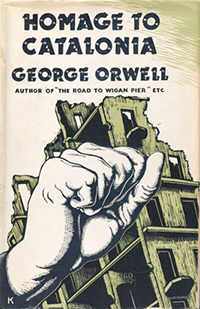 George Orwell’s book Homage to Catalonia was published in 1938 containing reflections on his experiences of the Spanish Civil War between December 1936 and June 1937. He returned to England after being wounded, forever associated with a certain romanticism about this war that has tended to overlook the subsequent fascist regime of Franco that lasted until the mid-70s. Some of that romanticism lives on in the imagined nation that would be an independent Catalonia.
George Orwell’s book Homage to Catalonia was published in 1938 containing reflections on his experiences of the Spanish Civil War between December 1936 and June 1937. He returned to England after being wounded, forever associated with a certain romanticism about this war that has tended to overlook the subsequent fascist regime of Franco that lasted until the mid-70s. Some of that romanticism lives on in the imagined nation that would be an independent Catalonia.
The imagined post-Brexit UK state-nation seems to be a more singularly English phenomenon, given that the Celtic nations (if that is what they are) voted to remain in the European Union (EU) in the Referendum, in the UK, last year. The exception is Wales that narrowly voted to leave. If a hard Brexit occurs and there is no special deal for Northern Ireland in respect of its close ties to the Republic of Ireland (ROI), why should the Celtic nations not cede from UK and join the ROI to create the Federal Republic of Celtalonia? The idea comes from a well-known economist of German origin who lives in the ROI, whose insight I formally acknowledge.
Let’s look at the facts;
- A joint population of around 15m and total national income of £460bn;
- Comparative and competitive advantage in advanced engineering and materials; aerospace; agri-food, the arts, culture and music; bio-tech and life sciences; business and financial services; higher education; ICT; oil, gas and energy; pharmaceuticals; shipbuilding and repairs; sport and leisure; and, tourism sectors. In other words, what is termed a modern knowledge economy;
- In population size terms, it would be about two million smaller than the Netherlands and three million bigger than Belgium;
- Its total national income would be about 15% smaller than the former but about 20% bigger than the latter;
- Nearly 30 universities that are internationally recognized;
- A large global diaspora that is economically, politically and culturally influential.
Remaining within the EU could make this new federation an influential modern medium-sized economy with a global purview and an internationally connected economy, that contains important links in a number of Global Value Chains (GVCs): the basis of modern trade. The conditions under which the federation would function may include:
- Three independent parliaments with a an upper house Senate representing the nations’ interests based on a qualified majority voting system;
- A Federal Central Bank with direct membership of three national central backs, akin to the Fed system in the US with membership of Euroepan Central bank (ECB);
- A system of fiscal federalism to distribute tax revenues between the nations and constituent regions appropriately (akin to Finanzausgleichgesetz in Germany);
- A Federal Constitutional Court to settle disputes in line with the European Court of Justice rules;
- A Federal Investment Bank modeled on the Caisses de Depots et Consignations in France linked to European Investment Bank (EIB) and European Bank for Reconstruction and Development (EBRD);
- Membership of the European Union and eventually Eurozone, in the event of the latter functioning as an Optimal Currency Area (OCA) as art of EU-wide economic reforms that end the institutionalization of austerity.
The list could go on to cover a range of policy areas as well as culture and sports but despite the apparent complexity, this is a modest proposal. Given the current UK government appears to want the ‘Break Up of Britain’, by promoting a hard Brexit (after Tom Nairn’s percipient book), Scotland may have no choice but to pursue independence; NI to re-unite with ROI; and, Wales to achieve its socio-economic potential. We can’t colonise the future but if the break-up is to be avoided, then the UK may have to remain a Member State of the EU. On the other hand Celtalonia may create greater benefits for its nations with formal EU Member State status.
Long live Celtalonia!
This was originally posted on Leslie Budd's 'The Sceptical Economist' blog.

Rate and Review
Rate this article
Review this article
Log into OpenLearn to leave reviews and join in the conversation.
Article reviews